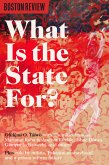
23,99 €
Versandfertig in über 4 Wochen

7,95 €
Sofort per Download lieferbar
Ähnliche Artikel

24,99 €
Versandfertig in über 4 Wochen
Broschiertes Buch
The New York Conference
12. März 2013
Verso

14,99 €
Versandfertig in über 4 Wochen
Broschiertes Buch
10. November 2015
Armchair Adventurer

Broschiertes Buch
27. Oktober 2022
Creative Media Partners, LLC

14,99 €
Versandfertig in über 4 Wochen
Broschiertes Buch
The Vote That Saved America and What We Still Have to Lose
5. Februar 2019
Encounter Books


Broschiertes Buch
(First)
Januar 2011
St. Augustine's Press

21,99 €
Versandfertig in über 4 Wochen
Broschiertes Buch
27. Oktober 2022
Creative Media Partners, LLC


16,99 €
Versandfertig in über 4 Wochen
Broschiertes Buch
18. Dezember 2018
Encounter Books

Ähnlichkeitssuche: Fact®Finder von OMIKRON
